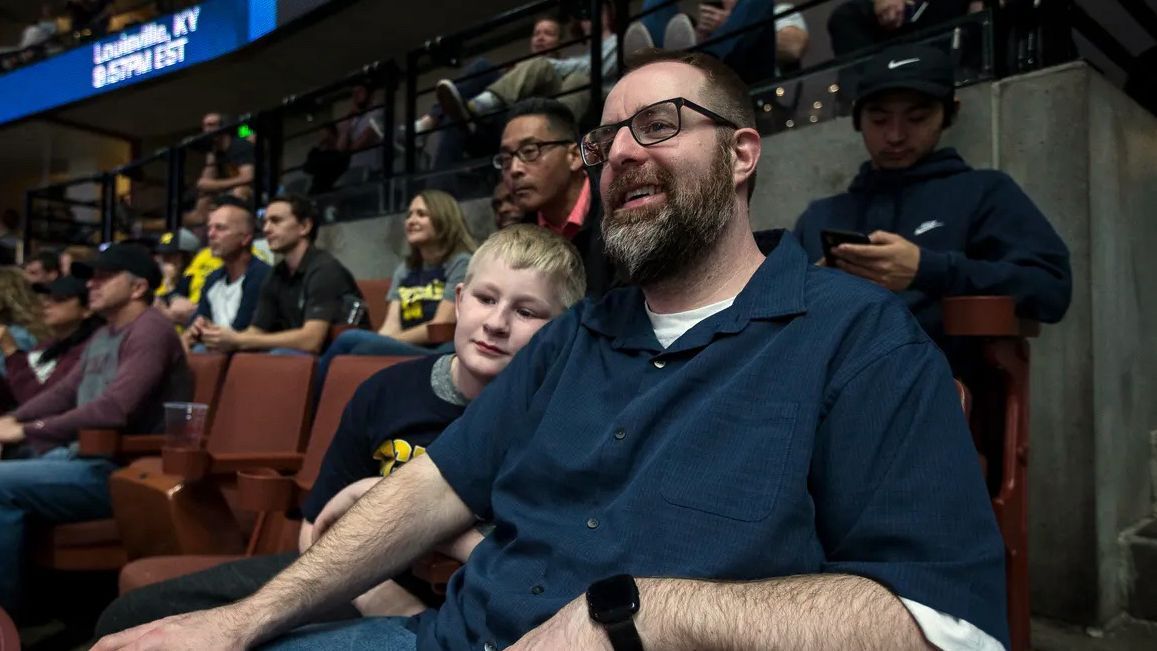March Madness and Bracket Busters
I dip my toe back into sports fandom with a March Madness bracket that picks my Tennessee Volunteers to win it all, and I share a story from ESPN of how those same Vols cost one man a perfect bracket.
It comes as no surprise to anyone who's ever read me on here or talked to me in real life since I was about the age of 21: Sports aren't as central to my life as they used to be.
I'm something like a fair-weather fan, except I'm not only a fan when things are going well for my preferred teams; I'm always a fan of my teams, but that's the connective tissue that holds me to the world of sports. It's because of my connection to the teams—geographically for some, alumni status at others, but always there, in the back of my mind, is the fact that I'm a fan of these teams, these organizations, these colors.
Because of that, I dutifully filled out at 2024 March Madness bracket that proudly predicted my Tennessee Volunteers, with the No. 2 seed, to go all the way. It's not a claim I should get to make with any degree of chest-puffery, for I did not watch many games this year. I followed through the news and living vicariously through friends still in Knoxville who actually and truly give a damn.
I filled out the bracket more so due to a sense of FOMO, like "What if this is the year my school wins a national championship? And what if when they did, I hadn't even bothered to pick them to do it?" The thought seemed untenable, so I cobbled together a mostly (99.9%) guess-based bracket. (The 0.01% was simply the fact that I was picking Tennessee all the way to the end.)
It made me think not just of that post I linked above, when I'd considered my connection to sports viewership through the lens of sports gambling, but of my recent trip back to Wyoming to visit my friends at the newspaper.
Jake and I would often put on an NBA game that we half-watched between catching up and chatting about all sorts of topics. At some point during a data-driven rundown from Scott Van Pelt on some collegiate ranking (I honestly barely understood it in the moment, so my write-around of the details is a more real than writerly affectation), I confessed that I didn't really enjoy the data- and metrics-first approach to talking about sports. He defended it as helpful, especially for something like the upcoming tournament, where he could download a lot of information and feel "caught up" based on his understanding of the data.
I didn't begrudge him that truth. I was envious of it, for I knew that if I'd simply re-engage with the subject matter, such comprehension could once again be at my fingertips. But I doubt I'll get there, just because of the time-suck of it all.
Which is why I loved this recent story from ESPN's Ryan Hockensmith.

It's a great piece of reporting, and absolutely my kind of piece—solidly in the "Nobody needs to know this, but I'll feel entertained and taken care of if I invest my time" camp.
The story is of Gregg Nigl and his nearly perfect 2019 March Madness bracket. It's got great detail about how random the bracket's success was to Nigl, but my favorite part is when Hockensmith zooms out and talks more broadly about "bracketology" as a phenomenon.
There's the sheer impossibility of picking a perfect one:
NO ONE HAS EVER picked a verified perfect NCAA men's bracket, and it's probably not going to happen in our lifetime, or the lifetime of our kids, or their kids, or their kids.
The possibility of getting every game right is often reported as 1 in 9.2 quintillion. But that figure is slightly hyperbolic. It's computed by assuming all 63 games are coin flips, when, in reality, quite a few NCAA games have much higher percentages in favor of one team. The actual odds of a knowledgeable person picking a perfect men's bracket are closer to 1 in 120 billion.
There's the insane popularity of brackets in general:
Yet we can't stop trying. About 40 million Americans fill out an estimated 70 million brackets every year, with around $2 billion in prizes, according to the American Gaming Association. The 64-team format was introduced in 1985, and within five years, the NCAA tournament had become synonymous with office pools. Many featured entry fees and prizes, which technically made them illegal but catnip for millions of employees over the years.
There are data-driven strategies and prognostication and application of expertise, but none of those really apply to me. No worries; I've still got a chance in this thing.
But Bilas, Jacobson and Nigl all agree about what the single biggest factor of any great bracket is: pure luck. Nigl picked mostly teams he'd never seen play a minute of basketball. Of the four 12- and 13-seeds to win in the opening round, Nigl got all four of them right, a virtually impossible feat. "Pretty much all luck," Nigl shrugs.
I find it comforting to know that, even if I took it way more seriously, the tournament (and therefore a well-performing bracket) is often a matter of luck. It's a great equalizer when it comes to tentatively rejoining the ranks of the sports-obsessed for a few weeks in March. I look forward to tip-off.
The nature of Nigl's improbable bracket and the inevitable midnight at which it turned back into a pumpkin shouldn't go unremarked upon.
Because his bracket was performing so well (at that point, 48 games played, 48 correct bracket entries) in 2019, the NCAA's media team had written about it. As a result, Buick, one of the tournament sponsors, wanted to fly Nigl to Anaheim to see his Michigan Wolverines play in the Sweet 16.
Right before that game started, he got another one right: Virginia beat Oregon, and he'd now picked 49 games correctly.
It was here the train would go off the tracks. With his 50th game, he'd experience his first loss, opening the floodgates to Sweet 16 and Final Four bracket that was decidedly less impressive. It was during his Wolverines' game that he got the news his streak was broken, and then bad news turned to worse, as the Wolverines would go on to lose the game (which he'd predicted).
But that 50th game? The one that technically cost him his perfect bracket? Well, that came from an overtime loss by none other than my Tennessee Volunteers, a No. 2 seed.
